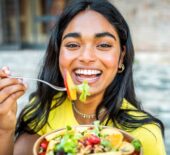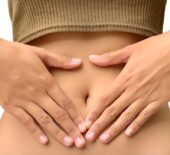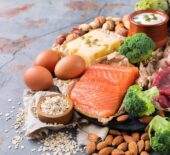Are you one of the ten women in Australia suffering from endometriosis? Endometriosis is when the lining of the uterus grows outside the uterus and this reproductive tissue spreads to one or multiple organs in your body and linked to pain during your period, during sex, pelvic pain, pain with urination or defecation, altered bowel functions and heavy menstrual bleeding.
The reason for this condition is not fully understood yet there is only suspected links like being exposed to estrogen for a longer period, so you get your period earlier and go into menopause later in life.
There is a relationship between diet and endometriosis. One study in 2017 showed there was a link in certain foods consumed and your risk of developing endometriosis. This study found red meat, trans fat and fruit all increased your risk. Fruit may be due to the pesticides on the fruit which is consumed when you eat the skin of a stone fruit or apple. The option could be going organic, but this may not be necessary or possible. Research has shown if you wash your fruit thoroughly in baking soda this can help to remove the pesticides from the skin of fruit.
The foods, nutrients, and specific macronutrients which you want to add into your diet to help reduce your risk of endometriosis include:
- Dairy - This is thought to be due to the vitamin D.
- B vitamins – From breads and cereals, fruits and vegetables, nuts and seeds, animal products from B12,
- A high antioxidant diet - Including all your serves of fruits and vegetables needed for your needs.
- Fibre – Meeting 25-30g of fibre needed a day for health.
- Healthy fat from fish or fish oil.
You may think that soy needs to be removed from your diet as it contains phytoestrogens which can weakly mimic estrogen in your body and weakly binds with estrogen receptors. However, the risk of including soy is not set in stone and some people, especially those following a vegan diet may be including this food as a staple source of calcium and protein. The best way forward is stick to the recommended 2 serves of soy a day and minimally processed over the ultra-processed foods which include soy like fake meat.
Specific mention needs to be given to the brassica or cruciferous vegetables including broccoli, cauliflower, kale, brussel sprouts and bok choy. These contain indoles which help aid the livers ability to naturally ‘detox estrogen’ which means there is less around to promote the growth of endometriosis. This group is also abundant in fibre which feed the good bacteria in your gut. These good bacteria make an enzyme which can change the function of estrogen which assists in keeping your risk of endometriosis.
Take home message: Nutrition alone is unlikely to solve endometriosis, but it does have an effect. Diet in combination with support from your doctor can allow your body the best health outcome and this is something which you deserve.








